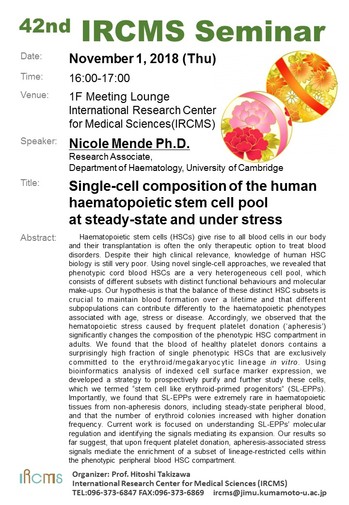- HOME
- IRCMS Seminars
- [November 1] 42nd IRCMS Seminar
IRCMS Seminars
[November 1] 42nd IRCMS Seminar
September 21 2018
We would like to inform you that the 42nd IRCMS Seminar has been scheduled as below. We would be pleased to see many of you participating in the seminar.
Date : November 1, 2018 (Thu)
Time : 16:00 - 17:00
Venue : 1F Meeting Lounge, International Research Center for Medical Sciences (IRCMS)
Speaker : Nicole Mende Ph.D.
Research Associate,
Department of Haematology, University of Cambridge
Title : Sequential acquisition of mutations in myelodysplastic syndromes
Abstract :
Haematopoietic stem cells (HSCs) give rise to all blood cells in our body and their transplantation is often the only therapeutic option to treat blood disorders. Despite their high clinical relevance, knowledge of human HSC biology is still very poor. Using novel single-cell approaches, we revealed that phenotypic cord blood HSCs are a very heterogeneous cell pool, which consists of different subsets with distinct functional behaviours and molecular make-ups. Our hypothesis is that the balance of these distinct HSC subsets is crucial to maintain blood formation over a lifetime and that different subpopulations can contribute differently to the haematopoietic phenotypes associated with age, stress or disease. Accordingly, we observed that the hematopoietic stress caused by frequent platelet donation ('apheresis') significantly changes the composition of the phenotypic HSC compartment in adults. We found that the blood of healthy platelet donors contains a surprisingly high fraction of single phenotypic HSCs that are exclusively committed to the erythroid/megakaryocytic lineage in vitro. Using bioinformatics analysis of indexed cell surface marker expression, we developed a strategy to prospectively purify and further study these cells, which we termed "stem cell like erythroid-primed progenitors" (SL-EPPs). Importantly, we found that SL-EPPs were extremely rare in haematopoietic tissues from non-apheresis donors, including steady-state peripheral blood, and that the number of erythroid colonies increased with higher donation frequency. Current work is focused on understanding SL-EPPs' molecular regulation and identifying the signals mediating its expansion. Our results so far suggest, that upon frequent platelet donation, apheresis-associated stress signals mediate the enrichment of a subset of lineage-restricted cells within the phenotypic peripheral blood HSC compartment.

